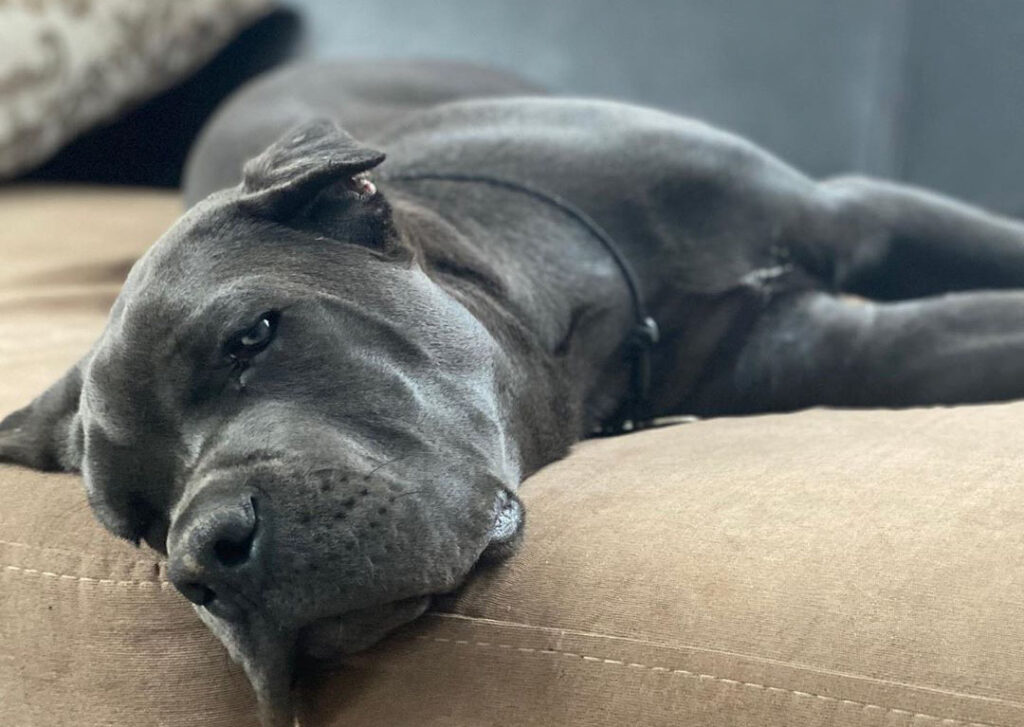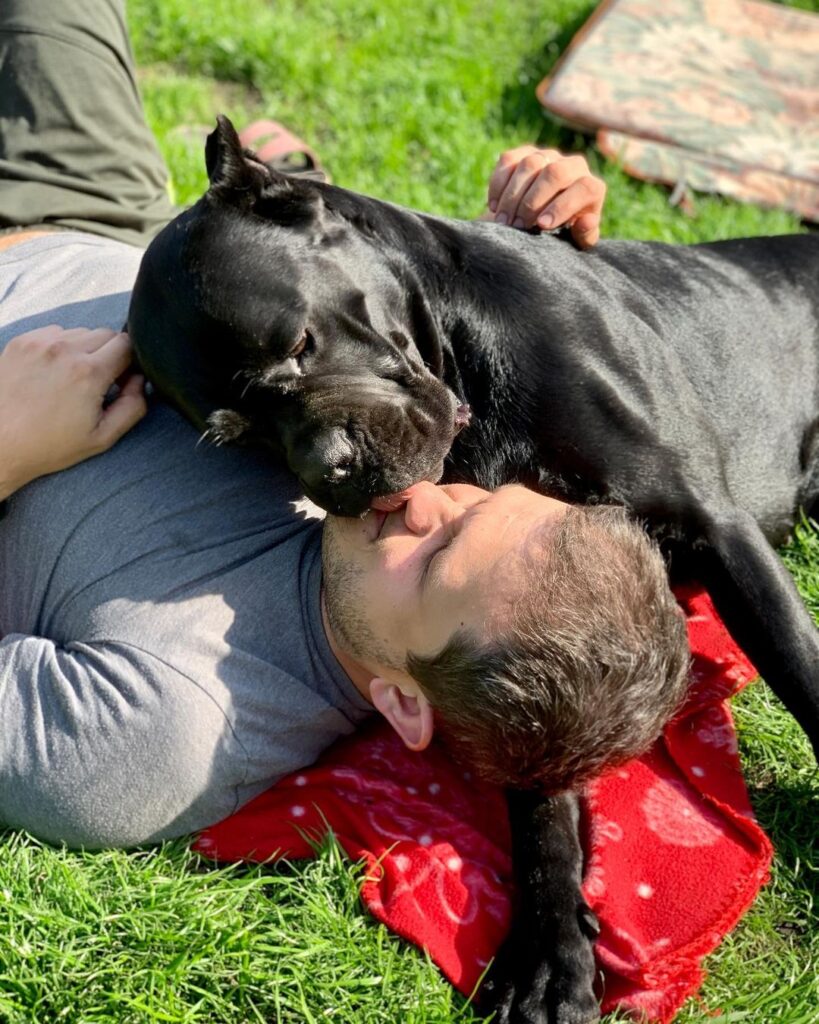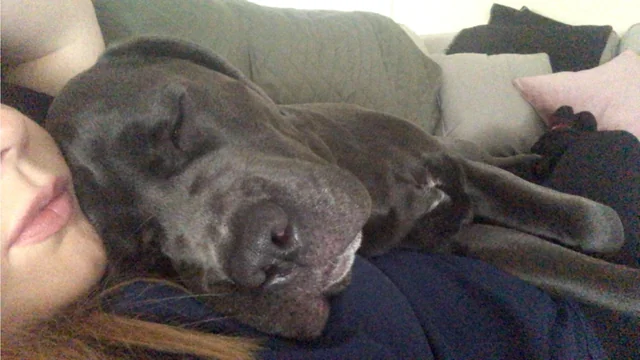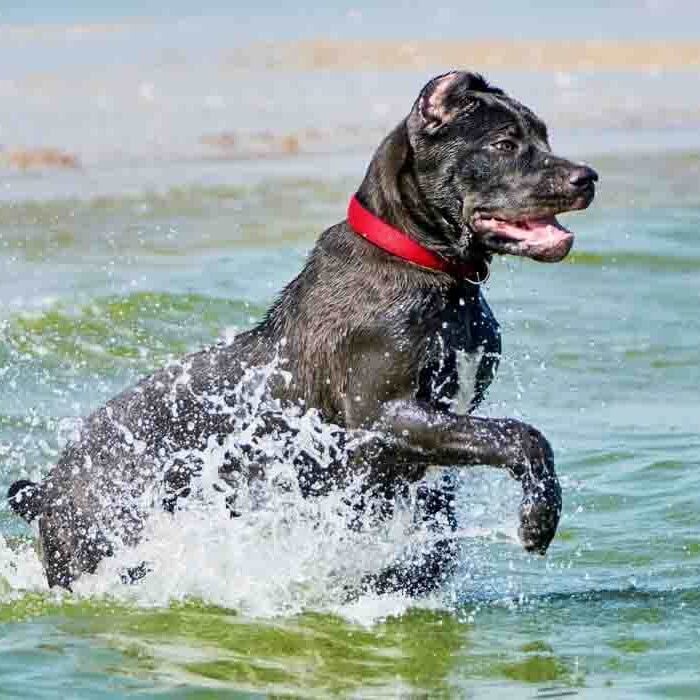
Cane Corsos are majestic and powerful dogs known for their strength and loyalty. One common question that often comes up is whether Cane Corsos can swim. Let’s explore this topic and some other interesting aspects of these magnificent breeds.
Do Cane Corsos Have Webbed Feet?
Cane Corsos are known for their powerful build and athleticism, but unlike some water-loving breeds, they do not possess fully webbed feet. However, their strong and muscular physique equips them well for swimming. Their dense bones and robust frame make them naturally buoyant, allowing them to navigate through water with efficiency. While their feet may not be webbed like those of a Labrador Retriever, their innate swimming abilities are attributed to their physique and overall body structure. This makes Cane Corsos capable of enjoying water activities and even swimming if introduced and trained properly.
Webbed Feet and Swimming Abilities
Although Cane Corsos lack webbed feet, their body composition plays a vital role in their swimming capabilities. Their well-developed chest muscles and strong legs provide the necessary propulsion in the water. This, combined with their instinctual paddling motion, enables them to move through water effectively. Their dense bones contribute to their natural buoyancy, aiding them in staying afloat. While they may not be as adapted to aquatic life as some other breeds, Cane Corsos can still enjoy and engage in swimming activities with proper supervision and training.
Natural Instincts of Cane Corsos
Cane Corsos have a history rooted in working alongside humans, often as guardians and protectors. This history has shaped their instincts and behavior. Their natural protective nature can influence their attitude towards other dogs. Cane Corsos might exhibit dominant behavior when interacting with unfamiliar dogs, especially if they perceive a potential threat. While early socialization and training can mitigate aggressive tendencies, it’s important to recognize that their protective instincts might influence their interactions.
Factors to Consider for Swimming
When introducing Cane Corsos to swimming, several factors come into play. It’s important to start with shallow waters and gradually build their confidence. Monitoring their energy levels and not forcing them into the water can prevent anxiety. Some Cane Corsos might take to swimming quickly, while others might need more time to adjust. Always be aware of water conditions, and consider using a life vest, especially for those less comfortable in the water. Patience and positive reinforcement can make swimming an enjoyable experience for your Cane Corso.
Do Cane Corsos Like Other Dogs?
Cane Corsos’ attitudes towards other dogs can vary based on their individual personalities, socialization experiences, and training. While their natural protectiveness might lead to initial wariness of unfamiliar dogs, early socialization can help them develop positive interactions. Proper exposure to well-mannered dogs from a young age can contribute to a well-adjusted and amicable Cane Corso.
Socialization and Canine Relationships
Socialization is crucial for Cane Corsos to build healthy relationships with other dogs. Exposing them to various dogs in controlled environments can help them understand proper social cues and reduce the likelihood of aggression. Positive encounters and supervised playdates can foster positive associations with other dogs, promoting harmonious interactions in various settings.
Cane Corsos’ Temperament Towards Other Dogs
Cane Corsos have a distinct temperament that includes loyalty, protectiveness, and territoriality. When encountering other dogs, their response can range from friendly to cautious. Their protective nature might lead to dominance challenges, especially with dogs of the same gender. Responsible ownership and proper training can help manage their temperament and foster positive behavior when interacting with other dogs.
Introducing Cane Corsos to Other Dogs
Introducing your Cane Corso to other dogs requires careful planning and management. Start with controlled and neutral environments, allowing them to get acquainted gradually. Keep interactions positive and reward good behavior. If you notice signs of tension or aggression, seek guidance from a professional dog trainer to ensure safe introductions and prevent negative associations.
What Age Do Cane Corsos Calm Down?
Cane Corsos, like many large breeds, go through distinct developmental stages that influence their behavior. Around the age of 2 to 3 years, they often start to exhibit calmer behavior compared to their energetic puppy phase. As they mature, their need for constant activity decreases, and they become more settled and composed. However, individual variations exist, and consistent training can contribute to a well-behaved Cane Corso at any age.
Understanding Cane Corsos’ Development Stages
Cane Corsos experience several developmental stages, including puppyhood, adolescence, and adulthood. Puppyhood is characterized by high energy levels, exploration, and the need for extensive training. During adolescence, some challenging behaviors might arise as they test boundaries. With proper training, patience, and understanding, Cane Corsos can reach adulthood with well-managed behavior and a calm demeanor.
When Does the Puppy Energy Subside?
Cane Corsos, like all puppies, undergo a phase of exuberant energy that gradually subsides. Generally, between 12 to 18 months, their energy levels start to stabilize. However, it’s essential to provide outlets for their energy through exercise, mental stimulation, and training. Engaging in regular physical activities and playtime can help manage their energy as they transition into a more mature stage.
Training and Maturity of Cane Corsos
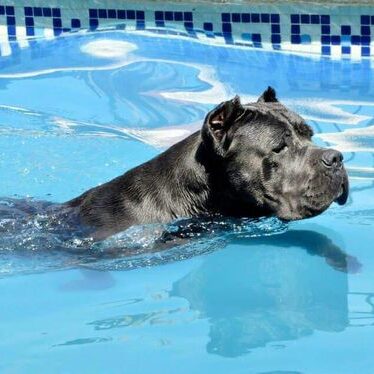
Training plays a pivotal role in shaping the behavior of Cane Corsos as they mature. Consistent and positive reinforcement-based training helps them understand commands, develop manners, and become well-behaved companions. Starting training early in puppyhood and maintaining it throughout their life contributes to a balanced and well-mannered Cane Corso.
Are Cane Corsos Dangerous?
The perception of Cane Corsos as dangerous dogs often stems from misunderstandings and misrepresentations. While their protective nature makes them excellent guardians, responsible ownership and proper training are key factors in determining their behavior. When raised in a loving and structured environment, Cane Corsos can be loyal, affectionate, and well-behaved companions.
Debunking Misconceptions
Cane Corsos are not inherently dangerous. It’s essential to differentiate between their natural guarding instincts and aggressive behavior. Early socialization, consistent training, and positive reinforcement contribute to their well-rounded temperament. Like any breed, their behavior is influenced by their upbringing and environment.
Cane Corsos’ Protective Nature
Cane Corsos have an innate protective instinct that stems from their history as working dogs. They are naturally inclined to guard their family and territory. This protective nature, when channeled through proper training, makes them reliable protectors and loyal companions. Their instinct to safeguard their loved ones is a testament to their strong bond with their human family.
Responsible Ownership and Training
Owning a Cane Corso comes with the responsibility of proper training and socialization. Responsible ownership includes understanding the breed’s characteristics, meeting their physical and mental needs, and providing consistent training. A well-trained Cane Corso is less likely to exhibit aggressive behavior, emphasizing the importance of responsible ownership in shaping their behavior positively.
Do Cane Corsos Like to Cuddle?
Cane Corsos might have a tough exterior, but they also possess an affectionate and loving side. While not all Cane Corsos are fond of cuddling, many enjoy physical closeness with their owners. Their affectionate behavior is often a reflection of the bond they share with their family members.
Cane Corsos’ Affectionate Side
Cane Corsos’ affectionate behavior manifests in various ways, such as leaning against their owners, following them around, and seeking physical contact. These gestures demonstrate their desire for closeness and companionship. Understanding and respecting their individual preferences for affection can strengthen the bond between you and your Cane Corso.
Individual Preferences in Cuddling
Just like people, Cane Corsos have unique personalities and preferences. Some may relish cuddling sessions, while others might prefer proximity without direct physical contact. Observing your Cane Corso’s body language and responses can help you gauge their comfort level with cuddling and ensure that your interactions are enjoyable for both of you.
Creating a Bond Through Cuddling
Cuddling can serve as a means to build and reinforce the bond between you and your Cane Corso. Regular, positive cuddling experiences can enhance their trust in you and strengthen your emotional connection. Whether it’s a gentle pat, a cozy snuggle, or a shared moment on the couch, these interactions contribute to a happier and more harmonious relationship with your beloved Cane Corso.
FAQs
- Can Cane Corsos swim naturally?
- Yes, Cane Corsos are generally good swimmers due to their natural physical attributes.
- Do Cane Corsos have webbed feet like some other water-loving breeds?
- No, Cane Corsos don’t have fully webbed feet like certain breeds, but their muscular build aids in swimming.
- Do all Cane Corsos enjoy being in the water?
- Not all Cane Corsos enjoy water activities; it depends on their individual personalities.
- Can I teach my Cane Corso to swim if they’re hesitant?
- Yes, you can gradually introduce them to water and provide positive experiences to build their confidence.
- Are there any precautions to take while letting my Cane Corso swim?
- Always supervise them while swimming, consider a life vest for safety, and be cautious of strong currents.
- At what age can I introduce my Cane Corso puppy to swimming?
- Around 6 to 8 weeks of age, you can start introducing them to shallow water to familiarize them.
- Are there any health concerns related to Cane Corsos swimming?
- Their heavy body structure might put stress on joints, so consult a vet if you’re concerned about their swimming activity.
- Do Cane Corsos require regular swimming sessions for exercise?
- Swimming can be a great form of exercise, but it’s not mandatory. Regular walks and playtime also suffice.
- Can I take my Cane Corso to public swimming areas?
- It depends on local regulations and the behavior of your dog. Ensure they are well-behaved and follow rules.
- What if my Cane Corso develops anxiety around water?
- If your Cane Corso shows signs of anxiety, consult a professional dog trainer to help address their fears.
With over 4 years of devoted companionship with my beloved Labrador Retriever, Robin, I have cultivated a deep understanding and expertise in all things canine. From training and behavior to health and well-being.

